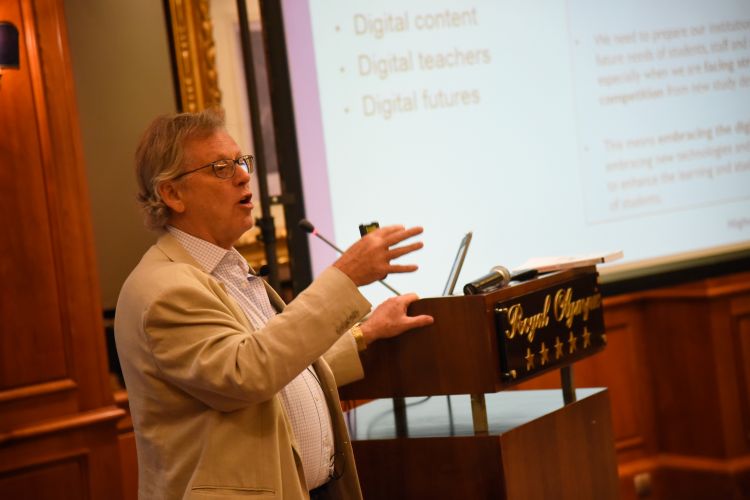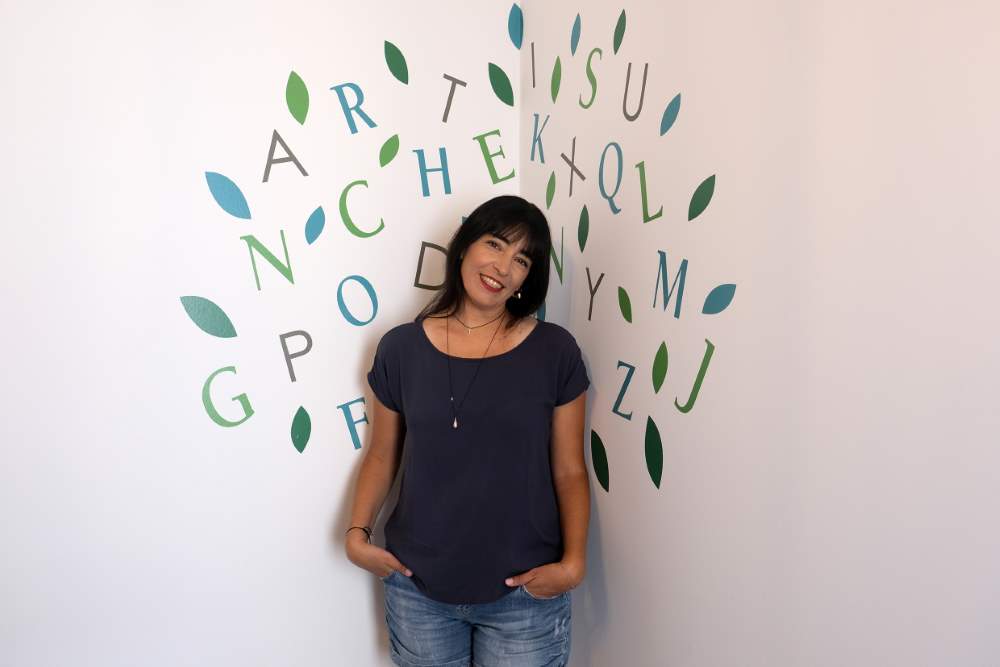Zafi Mandali holds a BA in English Language and Literature, Aristotle University of Thessaloniki, and an MA in Applied Linguistics, School of Humanities and Comparative Studies, University of Essex. She’s been Head of the English Department at Ellinogermaniki Agogi for twenty six years. She has gained two Gold and one Silver ELT Excellence Awards (2020-2021) for her Story Telling and her Literary Circles projects.
“My comfort zone is the class”, she says. “I also love writing (author of English Grammar exerciser 1 and 2, the Absolute Must in FCE, Use of English, and Composition books 1 and 2). My passion is to stage plays, sketches, role plays, act outs, read alouds, dramatised reading and organise story telling events. I contribute to TESOL e-magazine in the column “The spice element in teaching’ as well as to ELT NEWS.
Running the department of English is hectic but never boring. I recruit staff for the department of English, decide on course books and materials, liaise with parents and publishing companies, give staff consultation, attend parents’ evenings and work towards strong, productive student-teacher and teacher-parent relationships. I also plan afternoon and summer programmes, mentor teachers, delegate responsibilities, design and implement several individual and group projects, task based projects and extra –curricular activities like bazaars. I revise classroom support materials, activities, educational games, student testing and assessment and monitor their progress is the order of the day. Also keeping abreast of professional reading and developments in the ELT is a never ending process. Part of my lifelong learning is attending conferences, webinars and giving presentations.”
Prof. Stephen Krashen, one of the most distinguished linguists of our century, who was a plenary speaker at the 3rd Online Foreign Languages Forum, said that the best way to learn any language is through stories. You have been advocating the use of stories in teaching and learning for almost 20 years. How do you use stories in your classroom?
I use stories alongside conventional books. Our coursebooks contain few, if any, stories. What I do, and urge my staff to do, is to turn the content of each text into a story. There is a story in every message, picture, object, sentence, paragraph, text. We should not think of storytelling only as superheroes and magic potions. Instead, we should learn to see stories everywhere in events, actions, behaviours and facts. A teacher who acquires the story telling skill, discerns the characters, the events, the dilemmas, the crisis and the discussion points in the material at hand. The teacher reads the story elements in his text, as clearly as the radiologist sees the bones in x-rays. What I am basically suggesting is that we bring the context of what we teach in the foreground and build our lesson around it in story format. Any concept presented in story format, feeds the imagination and takes the reader to a kind of intellectual travel to experiences and differing points of view.
How do your students benefit from reading stories?
When reading stories, one mobilizes a multitude of learning processes as one is showered in language. The endlessly recycled vocabulary and structure is effortlessly acquired. Also, when reading, one learns how to “story” information and how to organize events and facts. Reading benefits students in that it nourishes their hopes, reinforces their creative thinking and molds their characters. Stories pass on global values, encourage awareness of self and of others and put us in a position to judge wrongdoing. Stories are a vent for feelings, experiences and human worries and so involve us all, not just students. It is unwise to allow stories to disappear in the digital labyrinth of our times because we are blocking our future generations from the wisdom which has been honed through many tellers and through various circumstances and beliefs. Stories ferry students to Neverland and this is a vital part of their healthy development. Also, according to a 2009 study at the University of Sussex, only six minutes of reading can slow down the heart rate and improve overall health. Reading calms the mind and relaxes the body and of course supports language learning.
Do stories activate student background knowledge?
Stories are the landscape of the natural world. Their power lies in that they tap on our prior knowledge. We already know that it is easier to learn something new when we attach it to something else. Brain research from Carnegie Mellon psychologists supports that activating prior knowledge is a critical step in the learning process and a major factor in reading comprehension. Stories tap into students’ prior knowledge and background experiences. If, for example, one reads Jules Verne’s “Around the world in 80 days’, one will journey from Vancouver, to Berlin, New York, Singapore, Rio de Janeiro, Brisbane and other places of the past and will recall what he already knows about the places and the period the novel is referring to. Stories, very much like complex texts, images, charts or other text types, activate and build background knowledge in preparation for new learning. Research by Deborah Short and Jana Echevarria with English language learners (ELLs) shows that activating and building prior knowledge plays a big role in improving academic literacy.
Do students share cultural, regional and/or ethnic traditions through stories?
Students indeed gain cultural, and ethnic traditions through stories. A contemporary case in point is David Heathcliffe and his storytelling project ‘Around the world in 88 tales’, where esteemed storytellers the world over, meet to exchange stories. This rich exchange of culture and knowledge is in fact, facilitated in our digital world. The extent and magnitude of a story’s sculpting power is undeniable. Stories make us more empathetic, pull us together around common values, and help us navigate life’s dilemmas. People can be made to think differently about race, class, gender, violence, ethics and just about anything else based on a single short story. When emotionally absorbed in character and plot we are easy to mold, and even easy to manipulate. Let us just remember the night of May 10, 1933 when the Nazis indulged in an ecstasy of book burning across Germany. The burnt books were written by Jews, modernists, and authors like Jack London, Theodore Dreiser, Ernest Hemingway, Thomas Mann. The value of books and stories in general is deemed undesirable by some as history has shown.
How do you choose your stories? What are the criteria e.g. human values, tolerance, respect etc.?
I have a taste for the rich world of storytelling and have built a repertoire of different types of short stories from the oral tradition. I like folktales which stretch back to our earliest ancestors and hold relevance in our lives today. Stories which carry a message, grip attention, employ repetitive structure and rich language, allow for variation in voice, gesture and movement when telling, come first. The cornerstone of storytelling is connection and audience awareness. As educators we need to inspire and lead by example. I think we do this better when, for instance, we teach leadership qualities and skills through stories. Stories bring up topics of respect for self and others, foster co-operation, global awareness and multicultural education and students accept these values because they are not lectured about them.
Do stories develop all language skills?
Certainly. It depends on what use we are putting our stories to. If students read stories they are exposed to recycled structure and vocabulary which helps language acquisition through constant repetition. If the story is accompanied with audio, the listening ability of the students is reinforced and so is their pronunciation. If students are involved in telling the story, their oral skills benefit. If students perform a story, their imagination and craft preparation skills are assisted. The story umbrella houses tales, myths, action songs, anecdotes among many other genres and helps us share fun, experience, wisdom, creativity, imagination and collaboration. In my school we involve the kids in storytelling related activities. In our story telling projects we involve the students as narrators, actors, tellers, performers. Students are trained to tell a story vividly, to command attention from the audience, to show originality, use facial expressions, vocal variety, eye contact, gestures, posture, articulation and enthusiasm. So stories develop more than language skills, Research on the Comprehension Hypothesis put forward by Steven Krashen and before him by Frank Smith and Kenneth Goodman claims that “we learn to read by reading, by understanding what is on the page”. His studies have failed to find a significant effect for the teaching of grammar on the reading and writing of native speakers of English (Krashen, 1984; Hillocks, 1986). Krashen (2003) concludes that grammar study has a very limited effect; gains are typically very modest, typically fade with time and are demonstrated only on tests in which there is a clear focus on form”. In other words, traditional, grammar-oriented methods of teaching are not effective enough. In my experience, reading stories develops all language skills, provided the procedure is graded and gradual.
Can we build a curriculum based on stories?
Quite honestly, we can. This curriculum can start with chant type stories and move on to classic or fixed fairy tales, folktales, parables, legends. It can then branch into wisdom or adventure stories or myths as the level rises. Undeniably, personal or real life anecdotes, stories of people who left their mark in our world, scientific stories or events which have changed the course of our lives, can only enrich such a curriculum. Stories, fictional or non-fictional are an inexhaustible source of material. I believe I will be embarking in such a project in the coming years. This material will not only teach language, but offer activities for proper intonation, mimicry, role play, drama, pantomime, movement and craft activities. This curriculum will promote imaginative thinking, arouse interest in English and encourage extensive reading.
Do you support the view that we are all stories?
Definitely; and some of us are the source of plain stories while others are the source of interesting, gripping, or even intense and unforgettable stories. And Jonathan Gottschall in “The storytelling animal” writes. “Humans evolved to crave story. This craving has, on the whole, been a good thing for us. Stories give us pleasure and instruction. They simulate worlds so we can live better in this one. They help bind us into communities and define us as cultures. Stories have been a great boon to our species”. In our digital age, stories are ubiquitous, immersive, interactive, dangerously attractive and sometimes they take over reality completely. Creative people like programmers, writers, social scientists, historians, visual artists and musicians weave the power of story art and collaborate to make virtual stories which erase the bleakness of modern life. Story land is outstripping real life in many ways and this is proof of the power of stories and our fascination of them.



